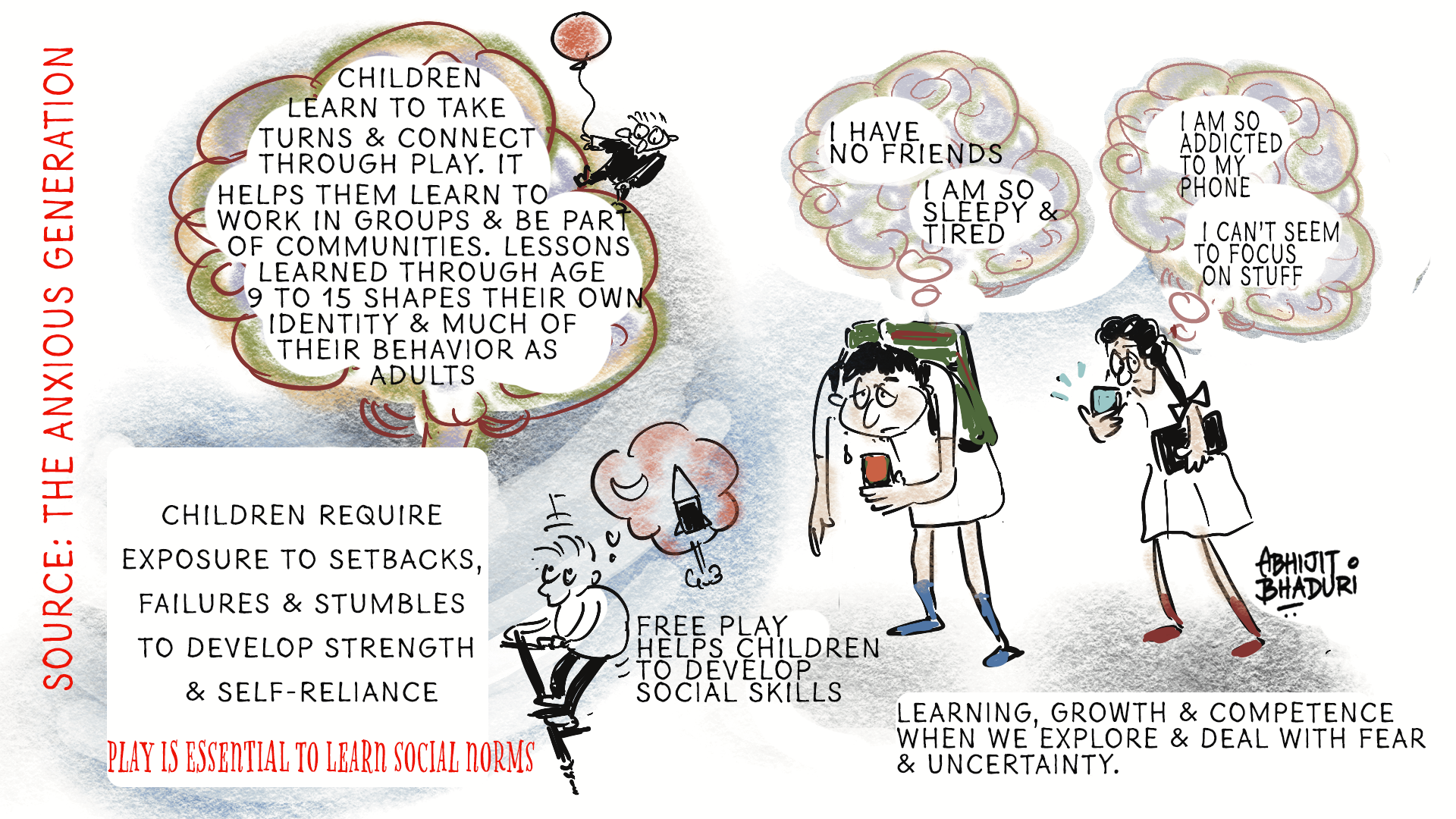The Anxious Generation by Jonathan Haidt
The Anxious Generation by Jonathan Haidt
The Anxious Generation by John Haidt traces a decline in young people’s mental health driven by a combination of social media, smartphones, and helicopter parenting. The result is a devastating impact on the mental health of teenagers.
Rise of smartphones, social media and helicopter parenting
All three are polarizing choices. Technology is an integral part of our life. There is no getting away from that. The parents give smartphones to children because they need to stay in touch with their children and ensure their safety. The children need it to access information and stay connected with the world. Social Media is also how children and their parents get their news and entertainment. The open spaces where children can play is decreasing in most cities.
Four scary outcomes
Unable to make friends in real life and hence lonely -Making friends in real life (IRL), means investing in the relationship, building trust, negotiating and dealing with egos, betrayal and love. It is not a simple and transactional as sending someone a “friend request” or blocking off someone who is annoying.
Phone Addiction is a thing: The smartphone is the device that has become the hub for finding a friends, love, money, religion and work. So we are spending increasing amount of time scrolling through our feed. We post a picture and seconds later run back to see how many “likes” it gathered. We have become more dependent on others approval.
Sleep deprived: With 8 to 10 hours sleep needed for a teen, studies show an average of 6.9 hours sleep by the time they enter senior year: a 1.5 hour decrease from sixth grade. This segment of the population equates to 69 percent of American teens sleeping less than 7 hours of sleep per night.
The Ohio State University conducted a study finding cell phone addiction is linked to an increase in sleep disorders and fatigue especially when used before bedtime. Read more and check this outHard to focus because attention is fragmented: A new study published today in Nature supports the concern. The research suggests that “media multitasking”—or engaging with multiple forms of digital or screen-based media simultaneously, whether they are television, texting or Instagram—may impair attention in young adults, worsening their ability to later recall specific situations or experiences. “Social media and many other facets of modern life are destroying our ability to concentrate,” says the Guardian
I asked people on LinkedIn about their beliefs on Parenting
Read the comments of some respondents <click this>
Helicopter Parenting
“The term “helicopter parenting” refers to a type of parent who‘s always hovering over their child’s every move. If you find yourself staying alert over your child’s every action and choice and are always nearby, paying close attention to every activity and interaction, you may be helicopter parenting.”
If you think this cartoon is just my imagination going wild, then let me confess, I have seen a version of this happen!!
Why Free Play is Important
Children learn through play to connect, synchronize, and take turns. Free Play allows the children to play in teams, learn to lose despite their best efforts and negotiate.
Columnist Manu Joseph says scathingly, “Ten-year-olds in my charmed colony have never gone to a shop alone to buy things for their home. And even if some of them do go down the half a mile to the market, they are equipped with phones and WhatsApp location-tracking, and they are filled by their parents with the terrors of life and all that can go wrong. Even large adolescent boys, their inner thighs colliding, walk with tiny maids half their size carrying their bulky cricket kits.” Read the rest of the article
Experiencing hardship, setback and disappointment in reasonable amounts during childhood builds resilience.
For me the biggest take away in The Anxious Generation is what is the easiest to fix - allowing children to get back their childhood. The smartphone works like a walkie-talkie through which the parents track every move of the kid. If the parents were to step back just a wee bit it would be a start. That means
Give the kid a “dumb phone” that lets you stay in touch with the kid. Wait until the kid is sixteen before you gift the kid a smartphone. The child can always access the internet on their parent’s device at home.
Encourage the kid to delay having a social media account until they get the smartphone.
Let the kid spend their playtime unsupervised. If you see them squabbling over something, let your child learn to sort it out. It is a life skill you will help them build.
Anxious parents who want to clear every stone and every weed and grease the system to make things better for their children land up passing on their anxiety to the kids. The anxious generation probably refers to the parents and children alike.







